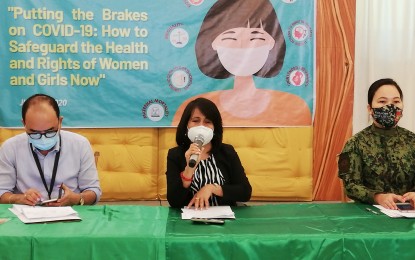
DELAYED DISTRIBUTION. Commission on Population and Development (PopCom) regional director Elnora Pulma (center) flanked by Leyte provincial health officer Edgardo Daya (left), and police regional women's and children protection desk chief, Capt. Ann Armeza during a World Population Day press briefing in Tacloban City on Thursday (July 9, 2020). Pulma said over one million modern family planning method commodities have not been delivered to provinces in Eastern Visayas this year due to logistical hurdles caused by coronavirus disease pandemic. (PNA photo by Sarwell Meniano)
TACLOBAN CITY - Over one million modern family planning commodities remain undelivered to provinces in Eastern Visayas this year due to logistic problems brought about by coronavirus disease (Covid-19) pandemic, an official said Thursday.
In a press briefing, Commission on Population and Development (PopCom) regional director Elnora Pulma said these undelivered items are stored in their office and at the warehouse of the Department of Health here.
These commodities include one million pills, 200,000 condoms, and 126,000 progestin sub-dermal implants intended for six provinces in the region this year.
“The biggest challenge is to bring these supplies to municipalities especially in Samar Island due to movement restrictions. These commodities are needed during the pandemic to prevent unplanned births,” Pulma told reporters.
She said their target is to bring these to the provincial health office before the end of the month.
She also asked local government units to provide logistics to bring these commodities to couples.
About 58.8 percent of the region’s couples are users of family planning methods with 40.9 percent of them adopting modern methods, the PopCom said.
In the case of Leyte province, provincial health officer Edgardo Daya said they have been tapping the inter-local health zone system to distribute these commodities
“When they go to the provincial health office to pick up vaccines and medicines, we ask them to bring family planning commodities. Towns clustered as health zones with ample supply share what they have to other rural health units,” Daya said.
Since March, local government units have been restricting the travel of their personnel to Palo, Leyte and Tacloban City where several regional offices of the national government are situated.
PopCom has been stepping up its family planning program drive as they project that nearly two million Filipino women of reproductive age, or those between 15 to 49 years old, will get pregnant this year as more couples stay at home.
Citing projections from the University of the Philippines Population Institute and the United Nations Population Fund, the situation will lead to an additional 214,000 unplanned births nationwide.
It is also believed that 10 percent of the births will be among women below 20 years of age, also with an additional 5,000 pregnancies.
The study revealed that among women 15 to 49 years old, there are about 3,099,000 with unmet need for family planning exacerbated by the pandemic.
With family-planning services impeded due to the nationwide community quarantines, an additional 590,000 might be added to the figure, bringing the total to 3,688,000 or a 19-percent jump with unmet needs.
The agency highlights the family planning services as part of World Population Day 2020 on July 11, a celebration that emphasizes safeguarding women’s and girl’s health and rights in the worldwide pandemic.
“The Covid-19 crisis has taken a staggering toll on people, communities, and economies everywhere. But not everyone is affected equally. Women, who account for the largest share of front-line health workers, for example, are disproportionately exposed to the coronavirus,” Pulma added. (PNA)
